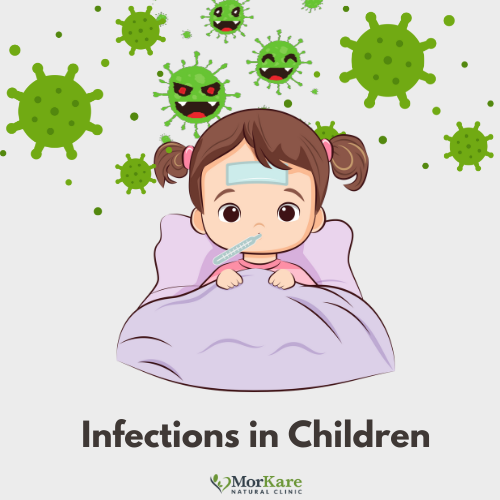
Are you concerned about your child’s frequent illnesses, especially after starting childcare? You’re not alone. Many parents experience this worry. This page addresses common concerns and offers natural approaches to support your child’s health.
Why Frequent Illness in Childcare?
Childcare environments expose children to various germs, viruses, and bacteria. This exposure, while initially leading to some illnesses, helps build their immune system. However, persistent illness can cause:
- Poor appetite and sleep
- Weight concerns
- Behavioral issues
- Family stress and work disruptions
How Morkare Can Help:
At Morkare, we focus on natural approaches to support children’s immune function and prevent illness. We offer:
- Naturopathy and Homeopathy: These popular practices aim to strengthen the body’s natural healing abilities.
- Nutritional Guidance: We provide personalized advice on diet and supplementation to address potential deficiencies.
- Gut Microbiome Support: We explore the link between gut health and immunity, offering strategies to promote gut balance.
Morkare’s Approach:
We take a patient-centered approach, tailoring our recommendations to each child’s unique needs and the family’s preferences. We believe in empowering parents with knowledge and tools to support their children’s health naturally.
Common childhood illnesses:
Hand, Foot, and Mouth Disease (HFMD):
- Cause: A viral infection spread through contact with saliva, respiratory secretions, or infected stool.
- Symptoms: Fever, mouth sores, blister-like rash on hands and feet.
Molluscum contagiosum:
- Cause: A contagious skin infection caused by a poxvirus.
- Symptoms: Small, pearly bumps with a dimple in the center, usually appearing on the face, trunk, or limbs.
Cold Sores (Fever Blisters):
- Cause: The herpes simplex virus (HSV-1).
- Symptoms: Tingling or burning sensation followed by small, fluid-filled blisters around the lips or mouth.
School Sores (Impetigo)
Cause:
The bacteria responsible for school sores can enter the body through:
- Broken skin, such as scratches, insect bites, or eczema.
- Direct contact with an infected person or contaminated object.
- Touching the nose or mouth after coming into contact with the bacteria.
Symptoms:
- Small, red, fluid-filled blisters that burst and form honey-colored crusts.
- Itching at the infected area.
- Sores often appear on the face, especially around the mouth and nose, but can also occur on the arms and legs.
Allergies:
- Cause: The immune system’s overreaction to a harmless substance (allergen) like pollen, dust mites, or food.
- Symptoms: Vary depending on the allergen, but can include runny nose, sneezing, itchy eyes, skin rash, wheezing, or anaphylaxis (a severe allergic reaction requiring immediate medical attention).
- Treatment: Avoiding triggers, medications like antihistamines and decongestants, and in severe cases, immunotherapy.
Warts:
- Cause: Caused by the human papillomavirus (HPV).
- Symptoms: Rough, raised bumps on the skin, often on the hands or feet.
- Treatment: Over-the-counter wart removal products, freezing, or removal by a healthcare professional.
Ear Infections (Otitis Media):
- Cause: Bacterial or viral infection in the middle ear.
- Symptoms: Earache, fever, fussiness, difficulty sleeping, and fluid drainage from the ear.
- Treatment: Antibiotics for bacterial infections, pain relievers, and monitoring by a healthcare professional.. Tonsilitis:
- Cause: Viral or bacterial infection of the tonsils, located at the back of the throat.
- Symptoms: Sore throat, difficulty swallowing, fever, swollen glands in the neck, and earache.
- Treatment: Antibiotics for bacterial infections, pain relievers, gargling with warm salt water, and staying hydrated.
Adenoiditis:
- Cause: Inflammation or swelling of the adenoids, located behind the soft palate in the nose.
- Symptoms: Snoring, trouble breathing, recurrent ear infections, and facial pain.
- Treatment: Decongestants, nasal corticosteroids, and in some cases, removal of the adenoids.
9. Gastrointestinal Infections:
- Cause: Viruses, bacteria, or parasites.
- Symptoms: Vomiting, diarrhea, fever, stomach cramps, and dehydration.
- Treatment: Supportive care, including fluids and electrolytes, and medication in some cases.
It is important to note that this information is intended for general knowledge only and should not be a substitute for professional medical advice. Always consult with a healthcare professional for diagnosis and treatment of any illness.
Childcare illness, natural immunity, homeopathy Australia, naturopathy Australia, gut health, children’s health, immune system support, allergies, ear infections, Morkare.

